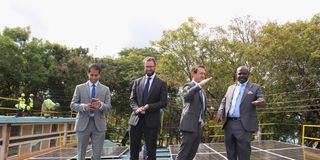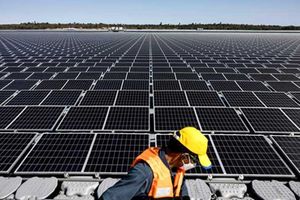Solar energy to save Makueni referral hospital Sh7m annually

Makueni Energy Executive Sebastian Kyoni (right) shows a team of British High Commission officials a roof at the county’s referral hospital roof lined up with solar panels on April 23, 2024.
What you need to know:
- The referral hospital currently pays around Sh2 million per month in electricity bills.
- Upon completion of the solar power project, the cost of electricity will reduce significantly by around Sh7 million per year.
Saddled with high power bills and rampant power outages, Makueni County Referral Hospital has made a big stride towards cutting its reliance on electricity by embracing solar energy. Transport and Energy Executive Sebastian Kyoni says the solar project will see the hospital cut its energy costs by Sh7 million per year.
The Sh28 million solarisation of the county’s biggest hospital is part of a long term plan by Governor Mutula Kilonzo Junior’s administration to spur sustainable economic growth by taking advantage of the long hours of sunshine experienced in the region to power agriculture, healthcare, manufacturing and water provision sectors.
“The referral hospital currently pays around Sh2 million per month in electricity bills. Upon completion of the solar power project, the cost of electricity will reduce significantly by around Sh7 million per year. This means we shall have recouped the cost of installing the solar project in four years,” Mr Kyoni said while inspecting the solar project in the company of visiting British High Commission officials.
“The solar panels that we are installing on seven roofs at the hospital are expected to produce 200 kilowatts of power, which is enough to support all operations at the facility,” he added.
Four months ago when the country was hit by a nationwide blackout, health workers, patients, hospital administrators and government officials held their breath after two diesel generators at the facility failed to start in unclear circumstances.
With this in mind, the planned energy transition has already sparked excitement at the hospital, which is historically plagued by blackouts. Health workers expect the solar energy to enhance service delivery at the level five hospital. Makueni Health chief officer Stephen Ndolo said the energy transition will herald enhanced accountability and transparency at the busiest hospital in the county.
“The transition is critical because we are going to full automation to enhance service delivery, accountability and transparency at the health facility. Having uninterrupted power supply during the day when we have the highest volume of patients is critical because it also means the computer systems supporting the automation will be able to run smoothly,” Dr Ndolo said, adding that the millions of shillings saved will go into revamping the hospital and hiring additional health workers.
Makueni County government has teamed up with UK Partnering for Accelerated Climate Transitions (Uk-pact), a United Kingdom-funded development programme that promotes the adoption of nature-based solutions to spur economic growth and accelerate climate change mitigation, Strathmore University and World Resources Institute, to champion the clean energy transition. “The world is moving towards a clean-energy future. We are privileged to enjoy long hours of sunshine in this region. We shall tap and put that resource into productive use. In keeping abreast with the rest of the world, we have adopted green energy for water pumping and powering our major hospitals. Solarisation of sub-county hospitals will start in the next financial year,” Mr Kilonzo Jnr said recently.
At the heart of the transition is a clean energy plan, which the county has adopted, and the setting up of a county energy centre located at Kisingo County Technical Training Centre. It is meant to promote the use of renewable energy in the county.
The economic counsellor at the British High Commission Daniel Wilcox said: “Solar energy guarantees a steady supply of clean energy. This means lower running costs while at the same time reducing greenhouse gas emissions into the atmosphere, which is good for the environment as well”.
mukusyamaundu@gmail.com


